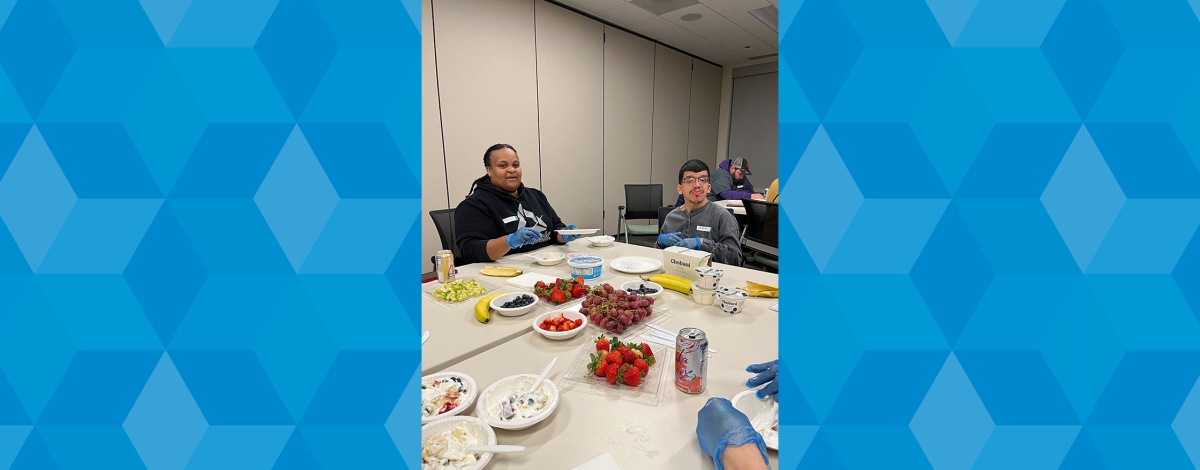Snackability: JCFS Residents Learn About Healthy Snacks
Over a dozen adults in JCFS Chicago’s Residential Supports program recently learned about healthy snacks, thanks to a nutrition initiative run by several local college students. The four-session program is the brainchild of JCFS nurse Janis Goodman.
After learning that the University of Illinois at Chicago (UIC) has a Nutrition program, Janis reached out to a professor and got the ball rolling. Soon there were three undergraduate students in the Disabilities and Human Development Capstone Class and a master’s student of Nutrition who began been visiting our Abe & Ida Cooper Center to teach residents about the different food groups, healthy choices, how to shop for and prepare healthy snacks and more.
“They seemed to like it a lot,” Janis said of the resident participants. “It’s been positive.”
Janis said that good nutrition is especially important for individuals with intellectual/developmental disabilities (I/DD) because obesity is disproportionately common in this group, for several reasons:
- They may have more difficulty understanding abstract nutritional concepts, such as calories and reading/interpreting nutrition labels to help select appropriate foods.
- It may be more challenging to resist immediate gratification.
- Accompanying physical factors, including medications, muscle tone or stamina, contribute as well.
Janis said there was a similar program years ago where nursing students taught individuals with I/DD in the JCFS Residential Supports system about wellness, but nutrition may not have been covered as in-depth as this program.
"In the past, some residents have participated in one-on-one nutrition counseling in an office setting with limited success,” she added. “Most insurance policies do not cover the cost of nutritional counseling without a specific medical diagnosis, so this was a way to implement a nutrition program without the cost.
"This was also the first time the college students had interacted with individuals with I/DD,” Janis said, adding that they were engaged and creative with their approach.
One week they set up stations where the residents got hands-on experience making healthy snacks and the following week they did some virtual grocery shopping. On the final day of class, the residents divided into three groups and made three different healthy snacks, which they shared with their peers and voted on their favorites.
The UIC Team even created a "Healthy Snack Cookbook" for each residential home, which includes pictures and step-by-step instructions to prepare all the healthy snacks that were presented during the four-week program.
"The warm and enthusiastic mutual relationship that formed between students and residents was incredible," Janis said.
The students agreed that the program was a success, and they were happy to meet in-person with the residents each week. They said it’s important to create a human connection and interaction with the residents to have a more engaging experience.
“It is wonderful to see the participants create and try some snack options that they probably haven't had before,” the students added. “We had instances where a resident took a picture of a healthy food option they got from the grocery store and showed us, demonstrating that they are engaged with what we shared and are incorporating it into their daily lives.”
The undergraduate students who presented the Healthy Snacks program include Carlos Ojeda, Faye Chapello and Anusha Veerla, while Magda Niemiec is the graduate student involved in the project.



 Back
Back